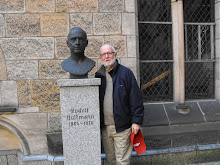

A number of folks have asked, “Why Berlin?” Hardly seems like a real missionary sort of place, does it? I mean it’s not a Third World or Developing World—or anyone of those other designations we give to those not of the First World (whatever that is!). It’s a major European city, growing and increasing in significance. It doesn’t really fit our stereotypical places for missions and missionaries. People don’t live in mud huts, walk miles to the nearest market, or struggle to survive—well, most of that is true, but survival? Well, that depends on your point of reference, doesn’t it….
The face of missions is changing. So often when we think of missions, we think third or developing world; we think traditional missionary paradigms; we think models that have little relevance for the growing gritty reality of an urban world. We think “out there” and rarely “here”; “East” but seldom “West.” Yet the idea that the responsibility for sending missionaries belongs to the West simply isn’t reality anymore. The idea of the Christian West is simply no longer true. And the sense that we have some exclusively God-given responsibility to evangelize the world—well, that’s not even biblical, right?
The fact is that more missionaries are being sent from developing nations to developing—and developed—nations than are being sent out of developed to underdeveloped nations. The fact is that these missionaries are often better received and more welcome. The fact is that the Christian West isn’t—and has, itself, become the recipient of missionaries.
So, why Berlin?
- Because there is a need for a new face on mission work in the West.
- Because there is a need for an urban approach to mission work in the West.
- Because there is a need for leadership development—everywhere.
- Because Berlin is an open, gateway city, that needs the Gospel.
- Because the Church of God in Germany feels a great burden to reach the city.
- Because Berlin seems the perfect city to develop new and creative responses to the needs of an increasingly pluralistic, urbanized world.
- Because Berlin is a dynamic, cosmopolitan and creative capital, allowing every kind of lifestyle. East meets West in Germany's largest city—a city of opportunity.
- Because more than 790,000 people under the age of 25 live in Berlin, 23.2% of the total population (3,416,255).
- Because Berlin is an ideal place for a dialogue between cultures: more than 473,000 non-German citizens live here from 195 different countries. More than 113,000 Turkish Berliners form the largest group, some of whose members are third-generation Berliners. Because Berlin is a welcoming city; a city of immigration. Ethnic and cultural diversity enrich the city, requiring special skills and making new demands on society.
- Because Berlin is located in the middle of a Europe in the throes of uniting. It is a symbol of the triumph of the old East-West conflict, and the continued growth of the European Union will open up greater opportunities for Berlin. To walk through the streets of the Former West and Former East Berlin is to believe that God is at work in the world and that much is possible.
- Because we believe God—and the God’s church in Germany—is calling us to this wonderful, dynamic, and demanding place to bring about his purposes through our gifts and expertise.

No comments:
Post a Comment